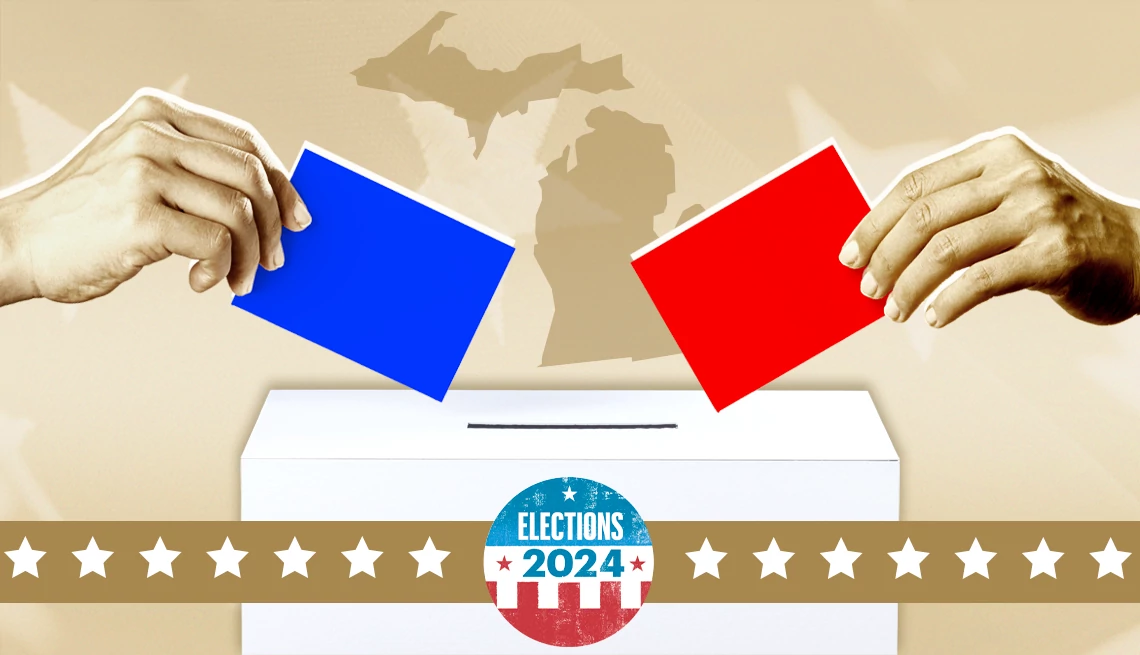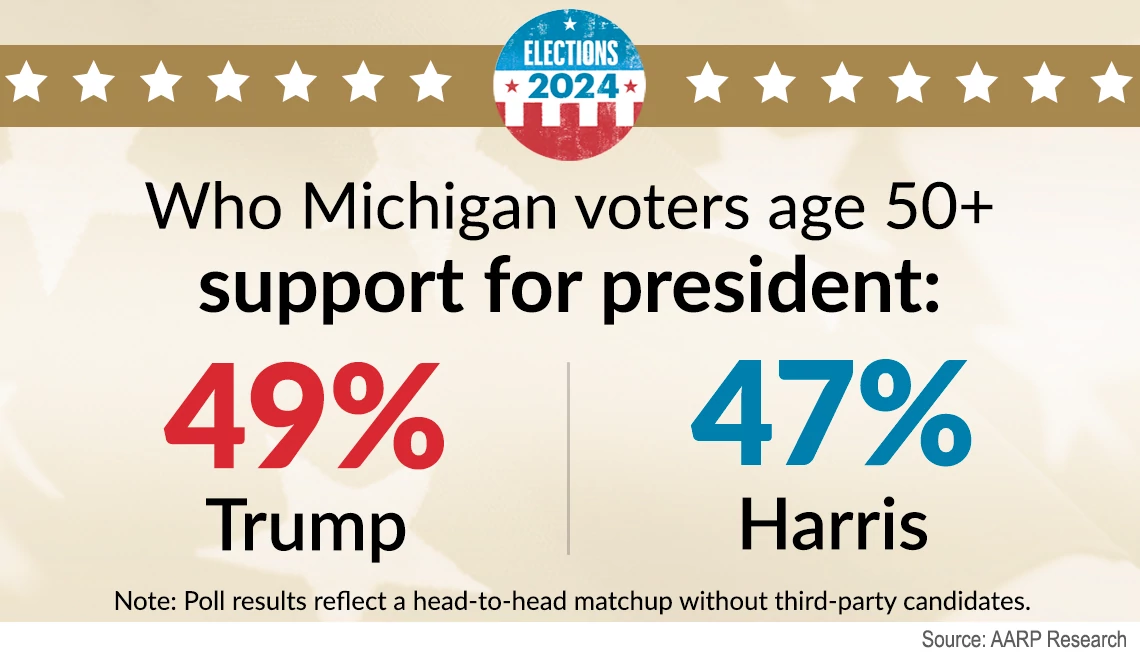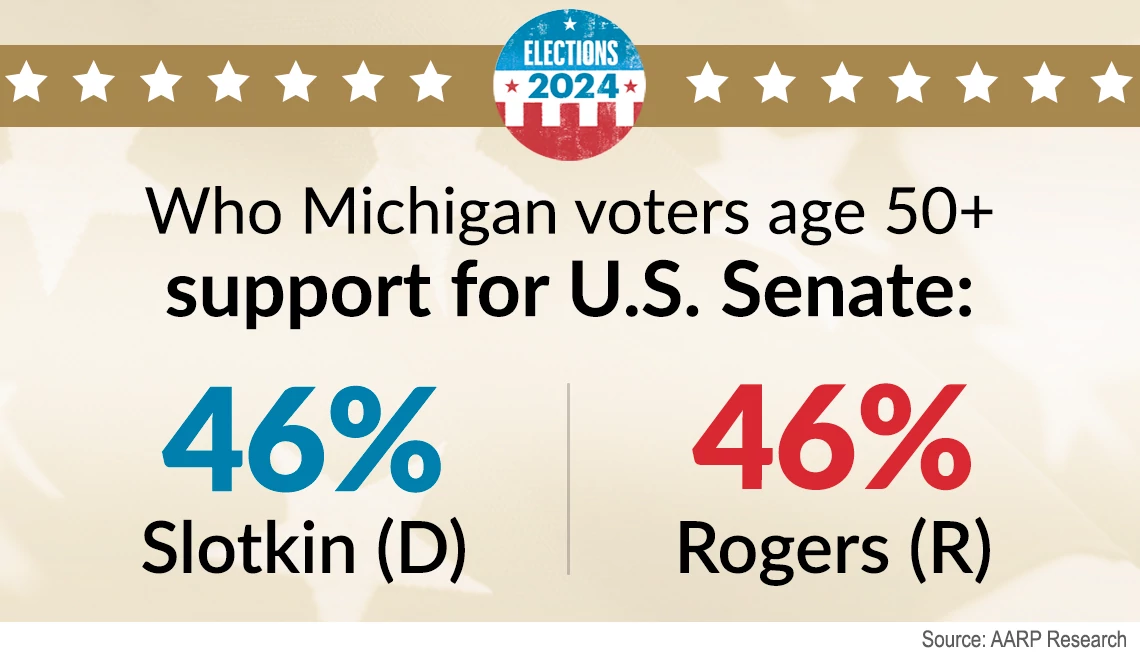AARP Hearing Center


Democrat Kamala Harris and Republican Donald Trump are tied among likely voters in the presidential race for the battleground state of Michigan, according to an exclusive AARP poll released Thursday. Forty-eight percent of likely voters favor each candidate in a head-to-head matchup.
When the lens shifts to voters 50-plus, former President Trump takes a 2-percentage-point lead, according to the poll. Forty-nine percent of older voters prefer Trump, while 47 percent favor Vice President Harris.
“Michigan is very much a toss-up state,” says Bob Ward, a partner with Fabrizio Ward, part of a bipartisan polling team that conducted the AARP-commissioned survey. “We are seeing that older voters are going to be playing a big role here. They’re more motivated to vote than younger voters.”
Fabrizio Ward and polling company Impact Research interviewed 1,382 likely Michigan voters from Aug. 7 through 11 about the presidential race and the issues motivating them to vote. Harris became the Democratic presidential nominee Aug. 5 after an online vote by the party’s convention delegates. President Joe Biden announced July 21 he was ending his reelection campaign, paving the way for Harris’ nomination. On Aug. 6, she chose Minnesota Gov. Tim Walz as her running mate. Trump’s vice presidential pick is U.S. Sen. JD Vance of Ohio.


When pollsters asked voters whom they would support in a race among Harris, Trump and several third-party candidates, Trump had a slight edge over Harris. Forty-five percent of likely voters polled would cast their ballot for the former president, and 43 percent would vote for Harris. Six percent favor third-party candidate Robert F. Kennedy Jr., who has gained access to the Michigan ballot. Four percent of likely voters remain undecided.
Michigan was a red state that flipped to blue four years ago when Biden won it, says Paula D. Cunningham, state director of AARP Michigan. Although this poll shows “people still are exploring and researching” the candidates and their stances on issues, Cunningham says independent voters can make a difference.
“We have a large number of independent voters, almost 30 percent, and they can swing an election either way,” Cunningham says.
Michigan is considered a battleground state in the 2024 presidential election. In 2020, Biden won the state by 2.8 percent — 154,000 votes. He received 50.6 percent of the vote that year, and Trump received 47.8 percent. The candidate who prevails in Michigan this November will receive 15 electoral votes toward the 270 needed to win the presidency.
Likely voters’ opinions of Trump and Harris are similar, the poll shows. Overall for Trump, 46 percent of likely voters have a favorable opinion while 50 percent have an unfavorable opinion. The numbers are nearly as close for Harris — 45 percent having a favorable opinion and 49 percent with an unfavorable opinion.


Voters also were asked about Michigan’s open U.S. Senate race. Among all voters polled, U.S. Rep. Elissa Slotkin, a Democrat, has a 3-percentage-point lead over former U.S. Rep. Mike Rogers, a Republican. Forty-seven percent of voters prefer Slotkin, while 44 percent prefer Rogers. Among voters 50-plus, the two are tied with 46 percent of likely voters favoring each candidate in a head-to-head matchup. That race to fill the seat of retiring Democrat Debbie Stabenow is “definitely a battleground Senate race,” Ward says.
































































More From AARP
AARP Poll: Presidential Race a Toss-Up in Georgia
Trump leads with older voters, but older Black voters heavily favor HarrisOlder Voters Will Decide the 2024 Elections
Americans 50-plus want politicians who care about a diverse array of issues8 Things to Know About Election Disinformation and AI
Artificial intelligence spreads, amplifies falsehoodsRecommended for You